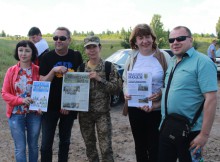The proving ground of the Operational Command (OC) West in the Rivne region, where the Ukrainian Armed Forces (UAF)’s units are undergoing team training, hosted the National Roundtable “The Military Press and Ukrainian Journalism: the Main Objectives, Development Prospects, and Sharing Successful Experience of Cooperation.” It focused on presenting to reporters and media editors from all over Ukraine the volunteer media project “Reformed Press to the Ukrainian Military.” In fact, it discussed how reformed local newspapers had managed not only break even, but also help to timely inform soldiers and produce so-called brigade newspapers. For instance, the 24th King Danylo of Galicia Berdychiv Iron Separate Mechanized Brigade became the first Ukrainian army combat unit to start publishing a print edition of Zalizna Volia (Iron Will) newsletter as part of a media volunteering effort. It quickly found support with volunteers helping other brigades, with similar publications launched by newspapermen from Sumy, Chernihiv, Rivne, and other regions.
“The reports of the imminent death of the print media are greatly exaggerated. Personally, I was genuinely surprised to learn that by the time this effort began, press officers of the Iron Brigade Volodymyr Fitio and Nazar Ilnytskyi had prepared and circulated on Facebook 55 weekly issues of the brigade newsletter Zalizna Volia. Clearly, not every soldier has access to Internet on the frontlines in Popasna, and printing out a number of copies using a ‘prehistoric’ printer is just unrealistic. So when the question arose, ‘Are local newspapers ready to help our military?’ Sumy was the first to respond,” senior consultant of the Information Policy Department of the Presidential Administration of Ukraine Oleksandr Bukhtatyi told us. “We brought the first composed and printed issue of Zalizna Volia to the frontlines just before Easter, and I can personally attest that all copies were taken fast by the soldiers and it was very positively received by its readers. After just a few weeks, we were able to establish a real and effective cooperation between reformed newspapers of Chernihiv and the 14th Brigade (based in Volyn, its press officer is Nadia Zamryha, its newsletter is called Volynskyi Shchyt (The Shield of Volyn)) and those from Rivne and the 128th Transcarpathian Brigade (press officer Natalia Meshcheriakova, newsletter Plich-o-Plich (Shoulder to Shoulder)). I hope that soon, not only all units of the OC West will have their own frontline media, but other combat units of the UAF will receive printed newspapers as well.”
According to Bukhtatyi, the idea of the newsletter, which originated with commander of the Iron Brigade Colonel Anatolii Shevchenko, is objectively necessary and useful for the Ukrainian military in general and for individual units, officers and enlisted people in particular. More generally, people serving at the frontlines experience a great shortage of Ukrainian press, so the national roundtable’s participants called Den’s experience of sending a few copies to the ATO area with volunteers three times a week important and worthy of imitation. “TV, radio, Internet and… trenches are, to put it frankly, not very compatible things,” Bukhtatyi added. “Newspaper is another matter. There is a dire shortage of Ukrainian publications in the ATO area. I think the problem is that, firstly, the lion’s share of the relevant government bodies’ attention has been focused on TV and radio. Without underestimating in the slightest the importance of all subsets of the media industry, we must recognize that the print media are still treated as a poor relation. After all, how else can one explain the fact that for decades, the state support of the print media has been set at... 50,000 hryvnias? This is the annual allocation for all of them. Moreover, the legislation bans any funding at all for political publications. However, once Debaltseve, Donetsk, Luhansk, and all our territories are liberated, which will inevitably happen sooner or later, will we need to rebuild, and possibly create from scratch Ukrainian local newspapers there? Clearly, we will. We will also need to bring there existing authoritative publications, such as Den. But where will money come for these startups? I believe that at this stage, the Ukrainian government will have to support the Ukrainian press.”







